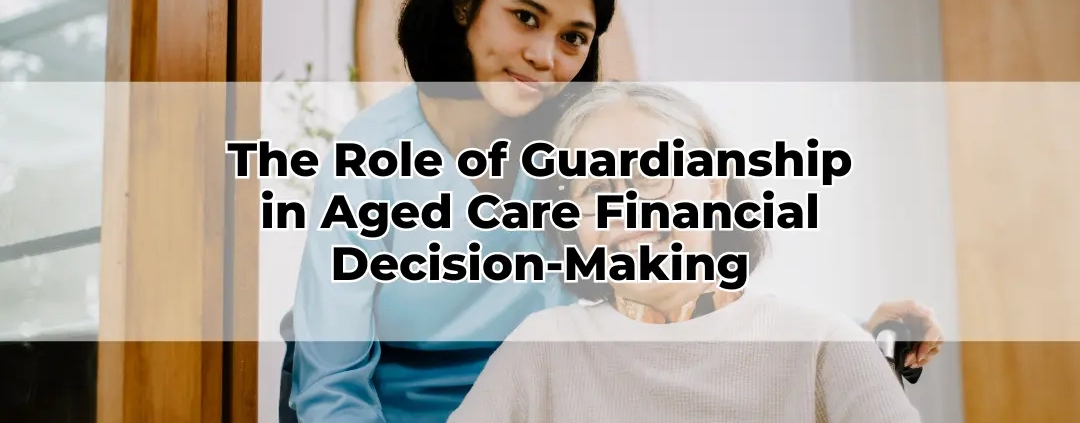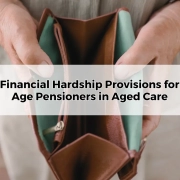The Role of Guardianship in Aged Care Financial Decision-Making
Table of Contents
ToggleGuardianship plays a pivotal role in aged care financial decision-making. As individuals age, their capacity to manage complex financial affairs may deteriorate due to cognitive decline, health conditions, or incapacity. In such circumstances, a legal guardian-appointed by a court or tribunal-can act in the individual’s best interests, particularly when no enduring power of attorney is in place. Understanding the mechanics of guardianship and its implications is crucial for families navigating aged care arrangements.
Guardianship is not merely a protective legal structure; it is a gateway to ensuring the preservation and appropriate use of financial resources in later life. Without a structured guardianship arrangement, vulnerable individuals may face financial mismanagement, delayed aged care transitions, and unintentional neglect. For families and carers, clarity around guardianship provides a foundation for responsible aged care financial planning, enabling smoother access to services, entitlements, and accommodation options.
When is Guardianship Required?
Guardianship becomes essential when an individual loses the capacity to make personal or financial decisions and has not appointed an enduring power of attorney. Capacity may be affected by dementia, stroke, psychiatric conditions, or other serious illnesses. When disputes arise over who should make decisions, or if exploitation is suspected, a guardianship order may be sought.
Tribunals assess evidence from medical professionals, carers, and family members before deciding whether a guardianship appointment is necessary. This legal safeguard ensures that decisions concerning the individual’s finances and personal welfare are made transparently and in their best interest. Guardianship is generally seen as a last resort, only invoked when informal arrangements or other legal mechanisms are insufficient to protect the person’s interests.
Types of Guardianship Orders
Guardianship orders vary by jurisdiction, but typically fall into two categories: personal guardianship and financial administration. A personal guardian makes decisions about accommodation, health care, and lifestyle, while a financial administrator (sometimes called a financial guardian) manages financial matters such as banking, assets, and aged care fees.
In aged care contexts, the financial administrator assumes a critical role-handling income streams, liaising with Centrelink, managing aged care costs, and ensuring compliance with means-tested fee structures. The appointment may be made to a trusted individual or to a statutory authority such as the Public Trustee, depending on family dynamics and the complexity of the estate.
The Tribunal Process for Appointing a Guardian
Each Australian state and territory has its own tribunal-such as QCAT in Queensland or NCAT in New South Wales-to determine guardianship matters. An application can be made by a family member, health professional, or social worker. The process involves the submission of evidence relating to the person’s capacity, their financial and personal circumstances, and potential risks if no guardian is appointed.
Tribunals aim to uphold the individual’s rights and dignity while balancing the need for protection. Guardianship orders are usually time-bound, reviewed periodically, and limited to the areas where the person lacks capacity. Where appropriate, the tribunal may also appoint multiple guardians to share responsibilities or ensure accountability.
The Responsibilities of a Financial Guardian
A financial guardian has a fiduciary duty to act in the best interests of the person under guardianship. This includes prudently managing funds, avoiding conflicts of interest, keeping meticulous records, and ensuring that the person’s aged care costs and living needs are sustainably met. The role demands financial acumen, ethical judgment, and ongoing reporting to relevant authorities.
Specific tasks may include lodging income assessments for aged care fees, overseeing property sales to fund accommodation bonds, paying regular care charges, and applying for government subsidies. Guardians must also navigate tax implications, superannuation drawdowns, and asset reallocation where necessary, all within legal parameters.
Impact on Aged Care Placement and Funding
Guardianship can significantly influence the timing and affordability of aged care placement. Without an authorised decision-maker, delays can occur in signing agreements, submitting financial assessments, or selling assets to meet upfront costs. This can hinder access to preferred care facilities and create undue stress for families and providers.
A guardian expedites these decisions, enabling smoother transitions into residential aged care or home care packages. They can approve refundable accommodation deposits, opt for daily payments, and structure funding to minimise means-tested fees. Their decisions must reflect both the financial best interest and the personal preferences of the person they represent, balancing fiscal prudence with dignity in care.
Guardianship Versus Enduring Power of Attorney
While both guardianship and enduring power of attorney (EPOA) relate to decision-making capacity, they function differently. An EPOA is a pre-emptive legal arrangement, made while the person still has capacity, empowering someone they trust to manage affairs if needed in the future. Guardianship, however, is imposed when no valid EPOA exists, or if the appointed attorney is unable or unwilling to act.
Where an EPOA is in place, guardianship may be unnecessary. However, if disputes arise or if the EPOA is found to be acting improperly, a tribunal may revoke the EPOA and appoint a guardian. It’s imperative for individuals and families to understand the distinction and proactively establish EPOAs to avoid the more complex guardianship process.
Financial Planning Considerations for Guardians
A financial guardian must navigate a host of planning considerations, especially when aged care is involved. These include cash flow management, investment of remaining assets, Centrelink strategies, and planning for future increases in care costs. It’s not a passive role-it demands active financial stewardship under scrutiny.
Guardians must also engage professionals-such as aged care financial advisers, accountants, and solicitors-to ensure they comply with regulations and optimise financial outcomes. Missteps in this area can lead to suboptimal care, financial shortfalls, or even personal liability. Therefore, guardians should approach the role with the same diligence as trustees or company directors.
Navigating Government Entitlements and Subsidies
One of the financial guardian’s key tasks is securing government entitlements. These may include the Age Pension, the Commonwealth Home Support Programme, Home Care Packages, or residential aged care subsidies. Means-tested assessments often determine eligibility and cost contributions, and they require accurate and timely financial disclosure.
Guardians must ensure that income and asset declarations are precise, as errors can result in overpayment, clawbacks, or denial of care. They also need to remain aware of evolving rules, particularly those relating to Centrelink income tests, rental exemptions for former homes, and the impact of gifting or loans. Knowledgeable navigation of these entitlements can yield substantial savings and enhance care options.
Common Challenges Faced by Guardians
Financial guardians often face a complex interplay of emotional, legal, and financial challenges. These can include resistance from family members, disagreements over asset use, ethical dilemmas about lifestyle choices, and conflicts with service providers. Guardians may also struggle with the volume of documentation and the need to justify every expenditure.
Additionally, guardians are sometimes required to make decisions without full clarity on the individual’s wishes, especially in cases of advanced dementia or limited personal history. In such cases, the principle of substituted judgment-making decisions the person would have made themselves-is applied. This can be burdensome and morally weighty.
Working with an Aged Care Financial Adviser
To reduce complexity and ensure compliance, guardians should collaborate with aged care financial advisers. These specialists provide strategic advice tailored to the aged care environment, helping guardians make informed choices about funding care, managing assets, and meeting obligations.
An aged care financial adviser can clarify cost structures, project future outflows, evaluate care payment options, and design efficient drawdown strategies from superannuation or other investments. They also assist in preparing accurate Centrelink declarations, avoiding excessive fees, and planning for potential longevity risks. This partnership enhances the quality of decision-making and safeguards the individual’s financial legacy.
Legal and Ethical Considerations
Guardianship carries serious legal and ethical responsibilities. Guardians must adhere to statutory obligations, maintain transparency, and avoid any appearance of self-dealing. Financial misconduct, even if unintentional, can result in tribunal investigations, revocation of authority, or civil penalties.
Ethically, guardians must weigh financial stewardship against personal dignity, honouring the individual’s lifestyle preferences and values even when these incur higher costs. For instance, choosing a higher-tier facility based on known preferences may conflict with strict financial rationality, but may be justified under ethical frameworks of person-centred care.
Conclusion
Guardianship is more than a legal formality-it is a critical pillar of financial protection for those unable to advocate for themselves in later life. It ensures that aged care arrangements are handled with competence, compassion, and accountability. Families navigating this terrain must understand the scope, limitations, and responsibilities of guardianship to ensure their loved ones receive both the financial support and the quality of care they deserve.
Early planning and professional support can mitigate the challenges associated with guardianship. Where possible, establishing enduring powers of attorney and engaging experienced financial advisers can create a more dignified and seamless aged care journey, preserving autonomy and ensuring peace of mind for all parties involved.









